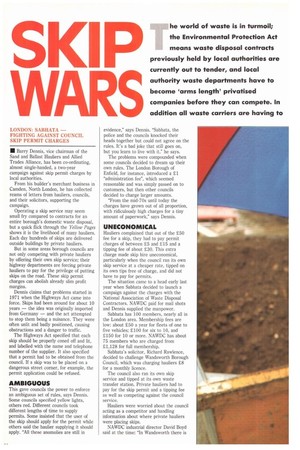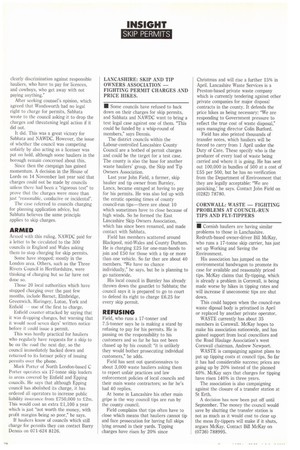he world of waste is in turmoil; the Environmental Protection
Page 38

Page 40

If you've noticed an error in this article please click here to report it so we can fix it.
Act means waste disposal contracts previously held by local authorities are currently out to tender, and local authority waste departments have to become 'arms length' privatised companies before they can compete. In addition all waste carriers are having to
• Barry Dennis, vice chairman of the Sand and Ballast Hauliers and Allied Trades Alliance, has been co-ordinating, almost single-handed, a two-year campaign against skip permit charges by local authorities.
From his builder's merchant business in Camden, North London, he has collected reams of letters from hauliers, councils, and their solicitors, supporting the campaign.
Operating a skip service may seem small fry compared to contracts for an entire borough's domestic waste disposal, but a quick flick through the Yellow Pages shows it is the livelihood of many hauliers. Each day hundreds of skips are delivered outside buildings by private hauliers.
But in some areas borough councils are not only competing with private hauliers by offering their own skip service; their highway departments are forcing private hauliers to pay for the privilege of putting skips on the road. These skip permit charges can abolish already slim profit margins.
Dennis claims that problems started in 1971 when the Highways Act came into force. Skips had been around for about 10 years — the idea was originally imported from Germany — and the act attempted to stop them being a nuisance. They were often unlit and badly positioned, causing obstructions and a danger to traffic.
The Highways Act specified that each Skip should be properly coned off and lit, and labelled with the name and telephone number of the supplier. It also specified that a permit had to be obtained from the council. If a skip was to be placed on a dangerous street corner, for example, the permit application could be refused.
AMBIGUOUS
This gave councils the power to enforce an ambiguous set of rules, says Dennis. Some councils specified yellow lights, others red. Different councils took different lengths of time to supply permits. Some insisted that the user of the skip should apply for the permit while others said the haulier supplying it should apply. "All these anomolies are still in evidence," says Dennis. "Sabhata, the police and the councils knocked their heads together but could not agree on the rules. It's a bad joke that still goes on, but you learn to live with it," he says.
The problems were compounded when some councils decided to dream up their own rules. The London Borough of Enfield, for instance, introduced a El "administration fee", which seemed reasonable and was simply passed on to customers, but then other councils decided to charge larger amounts.
"From the mid-70s until today the charges have grown out of all proportion, with ridiculously high charges for a tiny amount of paperwork," says Dennis.
UNECONOMICAL
Hauliers complained that out of the £50 fee for a skip, they had to pay permit charges of between £5 and £15 and a tipping fee of about £30. This extra charge made skip hire uneconomical, particularly when the council ran its own skip service at a cheaper rate, tipped on its own tips free of charge, and did not have to pay for permits.
The situation came to a head early last year when Sabhata decided to launch a campaign against the charges with the National Association of Waste Disposal Contractors. NAWDC paid for mail shots and Dennis supplied the manpower.
Sabhata has 100 members, nearly all in the London area. Membership fees are low: about £50 a year for fleets of one to five vehicles; £100 for six to 10, and £150 for 10 or more. NAWDC has about 75 members who are charged from £1,128 for full membership.
Sabhata's solicitor, Richard Rawlence, decided to challenge Wandsworth Borough Council, which was charging hauliers £8 for a monthly licence.
The council also ran its awn skip service and tipped at its own waste transfer station. Private hauliers had to pay for the skip permit and a tipping fee as well as competing against the council service.
Hauliers were worried about the council acting as a competitor and handling information about where private hauliers were placing skips.
NAWDC industrial director David Boyd said at the time: "In Wandsworth there is clearly discrimination against responsible hauliers, who have to pay for licences, and cowboys, who get away with not paying anything."
After seeking counsel's opinion, which agreed that Wandsworth had no legal right to charge for permits, Sabhata wrote to the council asking it to drop the charges and threatening legal action if it did not.
It did. This was a great victory for Sabhata and NAWDC. However, the issue of whether the council was competing unfairly by also acting as a licenser was put on hold, although some hauliers in the borough remain concerned about this.
Since then the campaign has gained momentum. A decision in the House of Lords on 14 November last year said that charges could not be made by councils unless there had been a "rigorous test" to prove that the charges were more than just "reasonable, conducive or incidental".
The case referred to councils charging for planning application advice, but Sabhata believes the same principle applies to skip charges.
ARMED
Armed with this ruling, NAWDC paid for a letter to be circulated to the 300 councils in England and Wales asking them to stop charging for skip permits.
Some have stopped; mostly in the London area. Others, such as the Three Rivers Council in Hertfordshire, were thinking of charging but so far have not done so.
Those 20 local authorities which have stopped charging over the past few months, include Barnet, Elmbridge, Greenwich, Haringey, Luton, York and Enfield -one of the first to charge.
Enfield counter-attacked by saying that it was dropping charges, but warning that it would need seven days' written notice before it could issue a permit.
This was hardly practical for hauliers who regularly have requests for a skip to be on the road the next day, so the council immediately backed down and returned to its former policy of issuing permits over the phone.
Mark Porter of North London-based C Porter operates six 17-tonne skip loaders in areas covered by Enfield and Epping councils. He says that although Epping council has abolished its charge, it has ordered all operators to increase public liability insurance from £750,000 to £.2m. This would cost an extra £1,100 a year which is just "not worth the money, with profit margins being so poor," he says.
If hauliers know of councils which still charge for permits they can contact Barry Dennis on 071-624 8126. LANCASHIRE: SKIP AND TIP OWNERS ASSOCIATION — FIGHTING PERMIT CHARGES AND PRICE HIKES.
• Some councils have refused to back down on their charges for skip permits, and Sabhata and NAWDC want to bring a test legal case against one of them. "This could be funded by a whip-round of members," says Dennis.
The district councils within the Labour-controlled Lancashire County Council are a hotbed of permit charges and could be the target for a test case. The county is also the base for another waste hauliers' group, the Skip and Tip Owners Association.
Last year John Field, a farmer, skip haulier and tip owner from Burnley, Lancs, became enraged at having to pay for his permits. He was also fed up with the erratic opening times of county council-run tips—there are about 10 which sometimes have to close because of high winds. So he formed the East Lancashire Skip Owners Association, which has since been renamed, and made contact with Sabhata.
Field has members scattered around Blackpool, mid-Wales and County Durham. He is charging £25 for one-man-bands to join and £50 for those with a tip or more than one vehicle. So far ther are about 40 members. "We have no chance individually," he says, but he is planning to go nationwide.
His local council in Burnley has already thrown down the gauntlet to Sabhata; the council says it is prepared to go to court to defend its right to charge £6.25 for every skip permit.
REFUSING
Field, who runs a 17-tonner and 7.5-tonner says he is making a stand by refusing to pay for his permits. He is passing on the responsibility to his customers and so far he has not been chased up by his council: "it is unlikely they would bother prosecuting individual customers," he adds.
Field has sent out questionnaires to about 3,000 waste hauliers asking them to report unfair practices and law enforcement policies of local councils and their main waste contractors; so far he's had 40 replies.
At home in Lancashire his other main gripe is the way council tips are run by the county council.
Field complains that tips often have to close which means that hauliers cannot tip and face prosecution for having full skips lying around in their yards. Tipping charges have risen by 20% since Christmas and will rise a further 15% in April. Lancashire Waste Services is a Preston-based private waste company which is currently tendering against other private companies for major disposal contracts in the county. It defends the price hikes as being necessary: "We are responding to Government pressure to reflect the true cost of waste disposal," says managing director Colin Burford.
Field has also printed thousands of transfer notes, which hauliers will be forced to carry from 1 April under the Duty of Care. These specify who is the producer of every load of waste being carried and where it is going. He has sent out 100,000 in bundles of 500 at a cost of £55 per 500, but he has no verification from the Department of Environment that they are legally acceptable: "We are panicking,' he says. Contact John Field on (0282) 78780.
CORNWALL: WASTE — FIGHTING PROBLEMS AT COUNCIL-RUN TIPS AND FLY-TIPPERS • Cornish hauliers are having similar problems to those in Lanchashire. Redruth-based owner-driver Bill McKay, who runs a 17-tonne skip carrier, has just set up Working and Saving the Environment.
His association has jumped on the environmental bandwagon to promote its case for available and reasonably priced tips. McKay claims that fly-tipping, which is already a problem in Cornwall, is being made worse by hikes in tipping rates and will increase if uneconomic tips are shut down.
This could happen when the council-run waste diposal body is privatised in April or replaced by another private operator.
WASTE currently has about 35 members in Cornwall. McKay hopes to make his association nationwide, and has gained support from local councillors and the Road Haulage Association's west Cornwall chairman, Andrew Newport.
WASTE is campaigning against plans to put up tipping costs at council tips. So far it has had considerable success; prices are going up by 20% instead of the planned 40%. McKay says that charges for tipping have risen 140% in three years.
The association is also campaigning against the closure of a transfer station at St Erth.
A decision has now been put off until September. The money the council would save by shutting the transfer station is not as much as it would cost to clear up the mess fly-tippers will make if it shuts, argues McKay. Contact Bill McKay on (0736) 788995.




























































































